Financial Reporting: Impact of IFRS on Government and Local Entities
VerifiedAdded on 2024/05/31
|7
|1677
|131
Report
AI Summary
This report examines the influence of International Financial Reporting Standards (IFRS) on the financial reporting practices of government and local entities, with a specific focus on Australia's implementation. It discusses the various changes required in accounting practices due to IFRS, including asset management and tax reporting, emphasizing the need for skilled professionals and updated tax laws. The report highlights Australia's proactive adoption of IFRS and its positive impacts, such as reduced capital costs and increased equivalence in accounting standards. It also addresses concerns related to the shift to IFRS, including the potential focus on core financial aspects over broader performance reporting, additional training requirements, and costs without immediate benefits for public sector entities. The report concludes by acknowledging the ongoing efforts to monitor and support the implementation of IFRS, encouraging local governments to prioritize its adoption despite the challenges.

FINANCIAL MANAGMENT
Paraphrase This Document
Need a fresh take? Get an instant paraphrase of this document with our AI Paraphraser
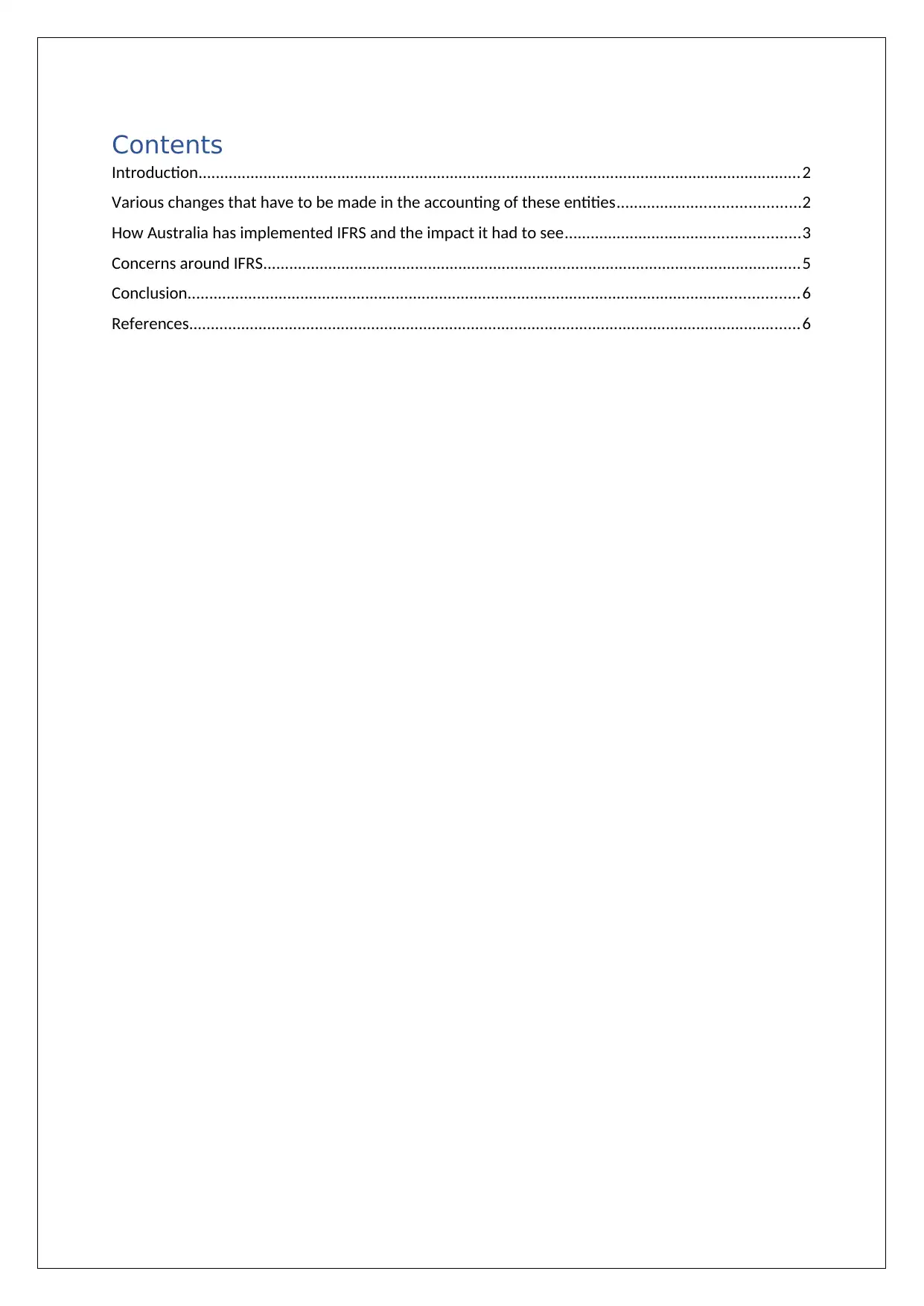
Contents
Introduction...........................................................................................................................................2
Various changes that have to be made in the accounting of these entities..........................................2
How Australia has implemented IFRS and the impact it had to see......................................................3
Concerns around IFRS............................................................................................................................5
Conclusion.............................................................................................................................................6
References.............................................................................................................................................6
Introduction...........................................................................................................................................2
Various changes that have to be made in the accounting of these entities..........................................2
How Australia has implemented IFRS and the impact it had to see......................................................3
Concerns around IFRS............................................................................................................................5
Conclusion.............................................................................................................................................6
References.............................................................................................................................................6
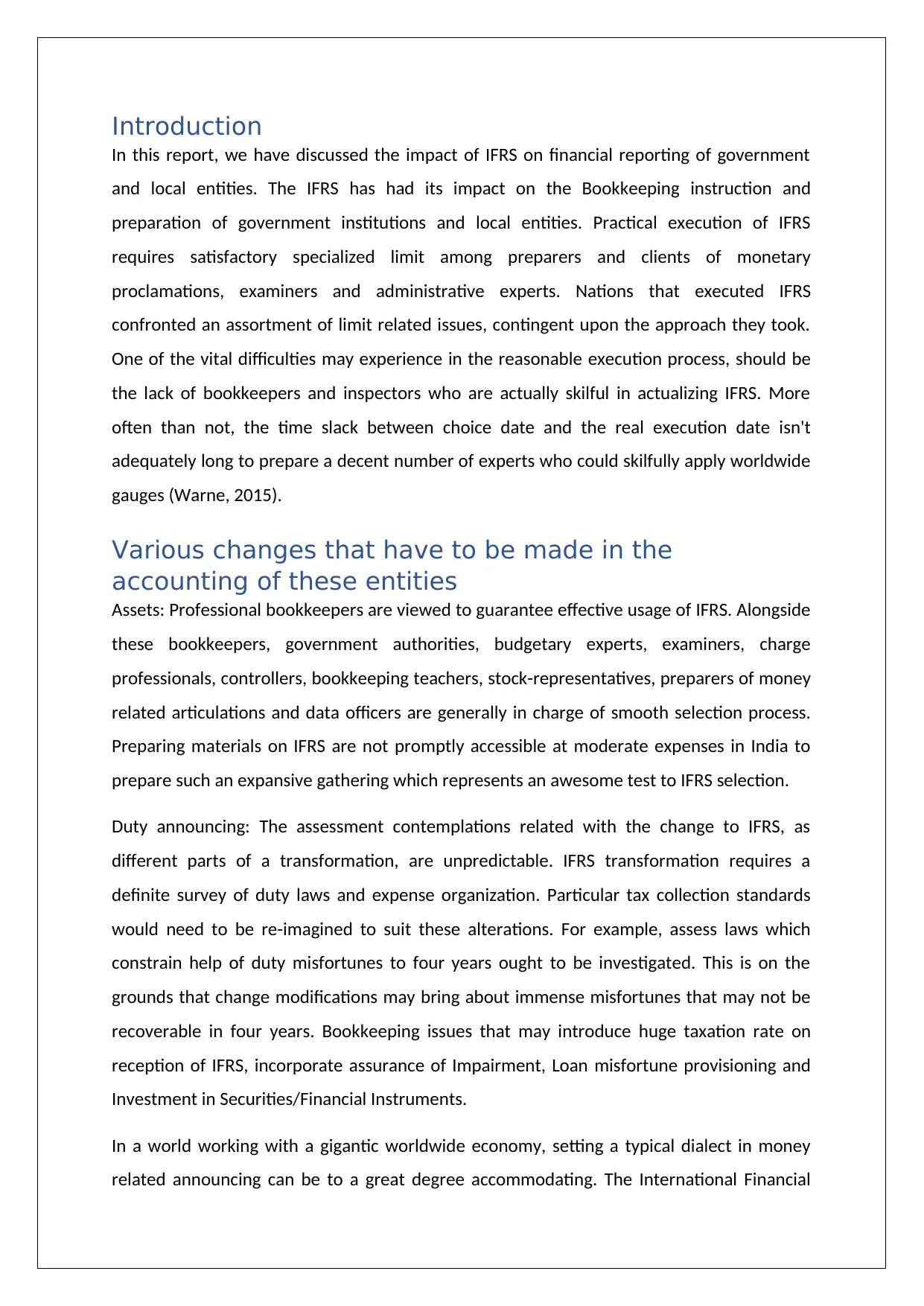
Introduction
In this report, we have discussed the impact of IFRS on financial reporting of government
and local entities. The IFRS has had its impact on the Bookkeeping instruction and
preparation of government institutions and local entities. Practical execution of IFRS
requires satisfactory specialized limit among preparers and clients of monetary
proclamations, examiners and administrative experts. Nations that executed IFRS
confronted an assortment of limit related issues, contingent upon the approach they took.
One of the vital difficulties may experience in the reasonable execution process, should be
the lack of bookkeepers and inspectors who are actually skilful in actualizing IFRS. More
often than not, the time slack between choice date and the real execution date isn't
adequately long to prepare a decent number of experts who could skilfully apply worldwide
gauges (Warne, 2015).
Various changes that have to be made in the
accounting of these entities
Assets: Professional bookkeepers are viewed to guarantee effective usage of IFRS. Alongside
these bookkeepers, government authorities, budgetary experts, examiners, charge
professionals, controllers, bookkeeping teachers, stock-representatives, preparers of money
related articulations and data officers are generally in charge of smooth selection process.
Preparing materials on IFRS are not promptly accessible at moderate expenses in India to
prepare such an expansive gathering which represents an awesome test to IFRS selection.
Duty announcing: The assessment contemplations related with the change to IFRS, as
different parts of a transformation, are unpredictable. IFRS transformation requires a
definite survey of duty laws and expense organization. Particular tax collection standards
would need to be re-imagined to suit these alterations. For example, assess laws which
constrain help of duty misfortunes to four years ought to be investigated. This is on the
grounds that change modifications may bring about immense misfortunes that may not be
recoverable in four years. Bookkeeping issues that may introduce huge taxation rate on
reception of IFRS, incorporate assurance of Impairment, Loan misfortune provisioning and
Investment in Securities/Financial Instruments.
In a world working with a gigantic worldwide economy, setting a typical dialect in money
related announcing can be to a great degree accommodating. The International Financial
In this report, we have discussed the impact of IFRS on financial reporting of government
and local entities. The IFRS has had its impact on the Bookkeeping instruction and
preparation of government institutions and local entities. Practical execution of IFRS
requires satisfactory specialized limit among preparers and clients of monetary
proclamations, examiners and administrative experts. Nations that executed IFRS
confronted an assortment of limit related issues, contingent upon the approach they took.
One of the vital difficulties may experience in the reasonable execution process, should be
the lack of bookkeepers and inspectors who are actually skilful in actualizing IFRS. More
often than not, the time slack between choice date and the real execution date isn't
adequately long to prepare a decent number of experts who could skilfully apply worldwide
gauges (Warne, 2015).
Various changes that have to be made in the
accounting of these entities
Assets: Professional bookkeepers are viewed to guarantee effective usage of IFRS. Alongside
these bookkeepers, government authorities, budgetary experts, examiners, charge
professionals, controllers, bookkeeping teachers, stock-representatives, preparers of money
related articulations and data officers are generally in charge of smooth selection process.
Preparing materials on IFRS are not promptly accessible at moderate expenses in India to
prepare such an expansive gathering which represents an awesome test to IFRS selection.
Duty announcing: The assessment contemplations related with the change to IFRS, as
different parts of a transformation, are unpredictable. IFRS transformation requires a
definite survey of duty laws and expense organization. Particular tax collection standards
would need to be re-imagined to suit these alterations. For example, assess laws which
constrain help of duty misfortunes to four years ought to be investigated. This is on the
grounds that change modifications may bring about immense misfortunes that may not be
recoverable in four years. Bookkeeping issues that may introduce huge taxation rate on
reception of IFRS, incorporate assurance of Impairment, Loan misfortune provisioning and
Investment in Securities/Financial Instruments.
In a world working with a gigantic worldwide economy, setting a typical dialect in money
related announcing can be to a great degree accommodating. The International Financial
⊘ This is a preview!⊘
Do you want full access?
Subscribe today to unlock all pages.

Trusted by 1+ million students worldwide
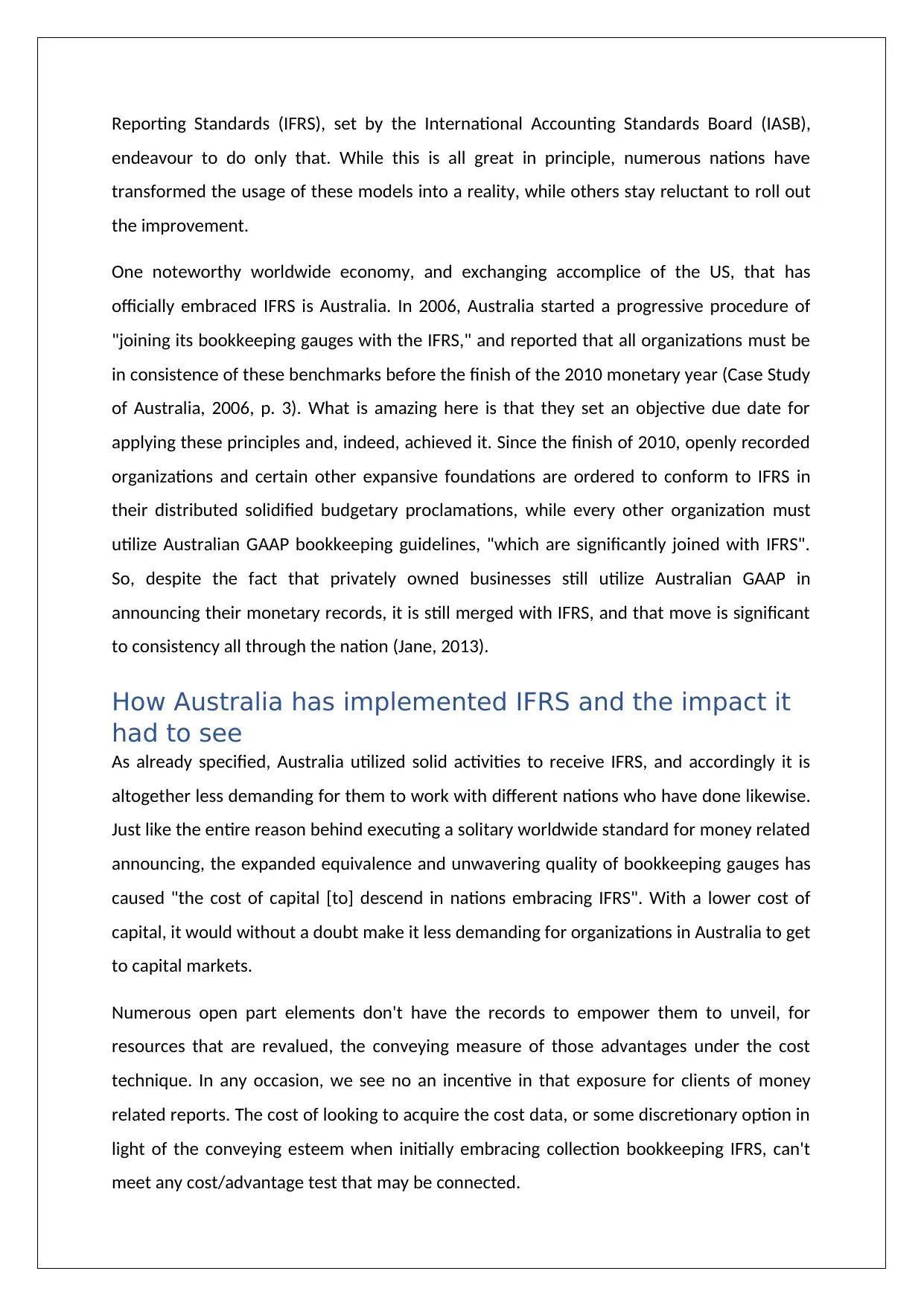
Reporting Standards (IFRS), set by the International Accounting Standards Board (IASB),
endeavour to do only that. While this is all great in principle, numerous nations have
transformed the usage of these models into a reality, while others stay reluctant to roll out
the improvement.
One noteworthy worldwide economy, and exchanging accomplice of the US, that has
officially embraced IFRS is Australia. In 2006, Australia started a progressive procedure of
"joining its bookkeeping gauges with the IFRS," and reported that all organizations must be
in consistence of these benchmarks before the finish of the 2010 monetary year (Case Study
of Australia, 2006, p. 3). What is amazing here is that they set an objective due date for
applying these principles and, indeed, achieved it. Since the finish of 2010, openly recorded
organizations and certain other expansive foundations are ordered to conform to IFRS in
their distributed solidified budgetary proclamations, while every other organization must
utilize Australian GAAP bookkeeping guidelines, "which are significantly joined with IFRS".
So, despite the fact that privately owned businesses still utilize Australian GAAP in
announcing their monetary records, it is still merged with IFRS, and that move is significant
to consistency all through the nation (Jane, 2013).
How Australia has implemented IFRS and the impact it
had to see
As already specified, Australia utilized solid activities to receive IFRS, and accordingly it is
altogether less demanding for them to work with different nations who have done likewise.
Just like the entire reason behind executing a solitary worldwide standard for money related
announcing, the expanded equivalence and unwavering quality of bookkeeping gauges has
caused "the cost of capital [to] descend in nations embracing IFRS". With a lower cost of
capital, it would without a doubt make it less demanding for organizations in Australia to get
to capital markets.
Numerous open part elements don't have the records to empower them to unveil, for
resources that are revalued, the conveying measure of those advantages under the cost
technique. In any occasion, we see no an incentive in that exposure for clients of money
related reports. The cost of looking to acquire the cost data, or some discretionary option in
light of the conveying esteem when initially embracing collection bookkeeping IFRS, can't
meet any cost/advantage test that may be connected.
endeavour to do only that. While this is all great in principle, numerous nations have
transformed the usage of these models into a reality, while others stay reluctant to roll out
the improvement.
One noteworthy worldwide economy, and exchanging accomplice of the US, that has
officially embraced IFRS is Australia. In 2006, Australia started a progressive procedure of
"joining its bookkeeping gauges with the IFRS," and reported that all organizations must be
in consistence of these benchmarks before the finish of the 2010 monetary year (Case Study
of Australia, 2006, p. 3). What is amazing here is that they set an objective due date for
applying these principles and, indeed, achieved it. Since the finish of 2010, openly recorded
organizations and certain other expansive foundations are ordered to conform to IFRS in
their distributed solidified budgetary proclamations, while every other organization must
utilize Australian GAAP bookkeeping guidelines, "which are significantly joined with IFRS".
So, despite the fact that privately owned businesses still utilize Australian GAAP in
announcing their monetary records, it is still merged with IFRS, and that move is significant
to consistency all through the nation (Jane, 2013).
How Australia has implemented IFRS and the impact it
had to see
As already specified, Australia utilized solid activities to receive IFRS, and accordingly it is
altogether less demanding for them to work with different nations who have done likewise.
Just like the entire reason behind executing a solitary worldwide standard for money related
announcing, the expanded equivalence and unwavering quality of bookkeeping gauges has
caused "the cost of capital [to] descend in nations embracing IFRS". With a lower cost of
capital, it would without a doubt make it less demanding for organizations in Australia to get
to capital markets.
Numerous open part elements don't have the records to empower them to unveil, for
resources that are revalued, the conveying measure of those advantages under the cost
technique. In any occasion, we see no an incentive in that exposure for clients of money
related reports. The cost of looking to acquire the cost data, or some discretionary option in
light of the conveying esteem when initially embracing collection bookkeeping IFRS, can't
meet any cost/advantage test that may be connected.
Paraphrase This Document
Need a fresh take? Get an instant paraphrase of this document with our AI Paraphraser
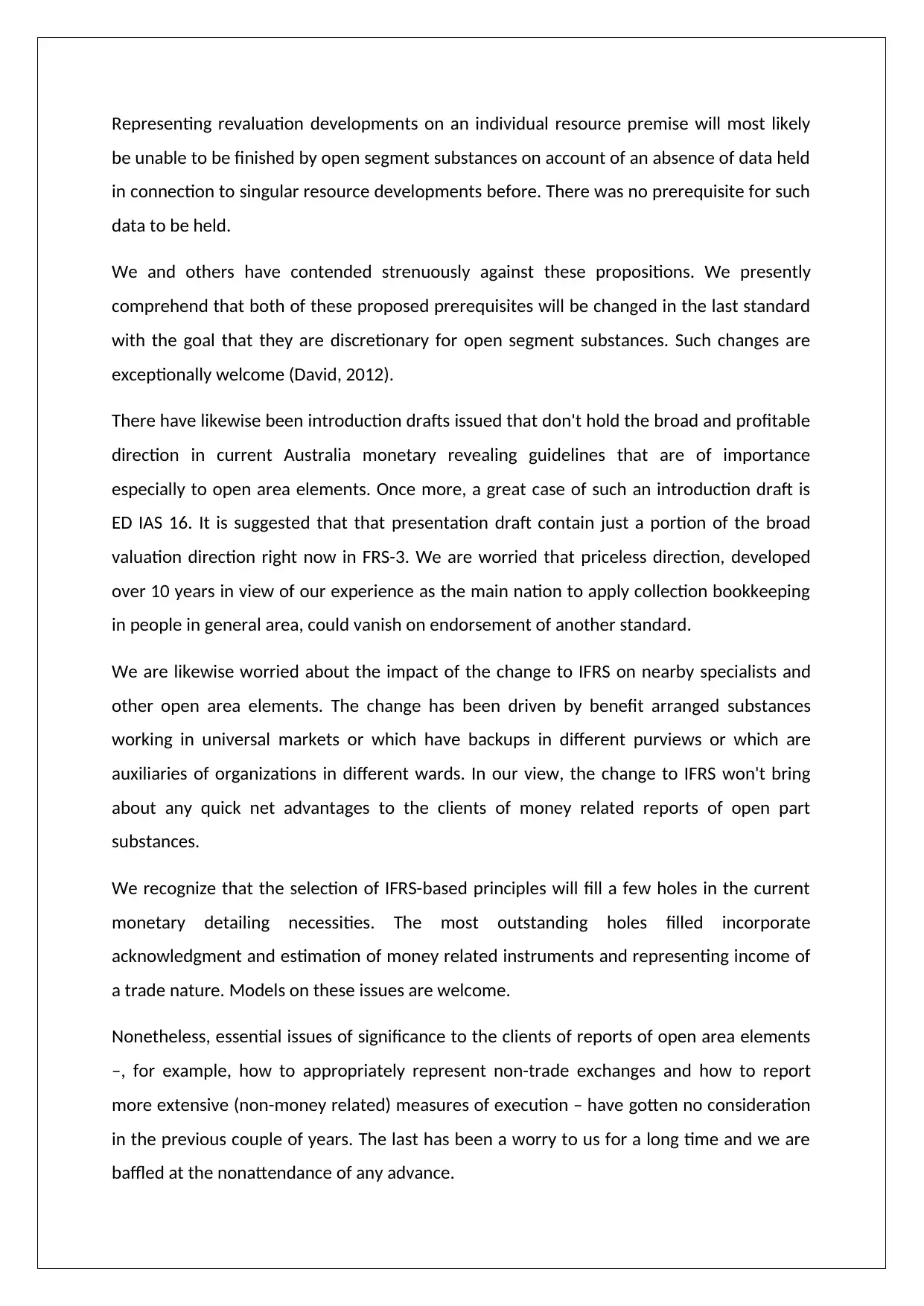
Representing revaluation developments on an individual resource premise will most likely
be unable to be finished by open segment substances on account of an absence of data held
in connection to singular resource developments before. There was no prerequisite for such
data to be held.
We and others have contended strenuously against these propositions. We presently
comprehend that both of these proposed prerequisites will be changed in the last standard
with the goal that they are discretionary for open segment substances. Such changes are
exceptionally welcome (David, 2012).
There have likewise been introduction drafts issued that don't hold the broad and profitable
direction in current Australia monetary revealing guidelines that are of importance
especially to open area elements. Once more, a great case of such an introduction draft is
ED IAS 16. It is suggested that that presentation draft contain just a portion of the broad
valuation direction right now in FRS-3. We are worried that priceless direction, developed
over 10 years in view of our experience as the main nation to apply collection bookkeeping
in people in general area, could vanish on endorsement of another standard.
We are likewise worried about the impact of the change to IFRS on nearby specialists and
other open area elements. The change has been driven by benefit arranged substances
working in universal markets or which have backups in different purviews or which are
auxiliaries of organizations in different wards. In our view, the change to IFRS won't bring
about any quick net advantages to the clients of money related reports of open part
substances.
We recognize that the selection of IFRS-based principles will fill a few holes in the current
monetary detailing necessities. The most outstanding holes filled incorporate
acknowledgment and estimation of money related instruments and representing income of
a trade nature. Models on these issues are welcome.
Nonetheless, essential issues of significance to the clients of reports of open area elements
–, for example, how to appropriately represent non-trade exchanges and how to report
more extensive (non-money related) measures of execution – have gotten no consideration
in the previous couple of years. The last has been a worry to us for a long time and we are
baffled at the nonattendance of any advance.
be unable to be finished by open segment substances on account of an absence of data held
in connection to singular resource developments before. There was no prerequisite for such
data to be held.
We and others have contended strenuously against these propositions. We presently
comprehend that both of these proposed prerequisites will be changed in the last standard
with the goal that they are discretionary for open segment substances. Such changes are
exceptionally welcome (David, 2012).
There have likewise been introduction drafts issued that don't hold the broad and profitable
direction in current Australia monetary revealing guidelines that are of importance
especially to open area elements. Once more, a great case of such an introduction draft is
ED IAS 16. It is suggested that that presentation draft contain just a portion of the broad
valuation direction right now in FRS-3. We are worried that priceless direction, developed
over 10 years in view of our experience as the main nation to apply collection bookkeeping
in people in general area, could vanish on endorsement of another standard.
We are likewise worried about the impact of the change to IFRS on nearby specialists and
other open area elements. The change has been driven by benefit arranged substances
working in universal markets or which have backups in different purviews or which are
auxiliaries of organizations in different wards. In our view, the change to IFRS won't bring
about any quick net advantages to the clients of money related reports of open part
substances.
We recognize that the selection of IFRS-based principles will fill a few holes in the current
monetary detailing necessities. The most outstanding holes filled incorporate
acknowledgment and estimation of money related instruments and representing income of
a trade nature. Models on these issues are welcome.
Nonetheless, essential issues of significance to the clients of reports of open area elements
–, for example, how to appropriately represent non-trade exchanges and how to report
more extensive (non-money related) measures of execution – have gotten no consideration
in the previous couple of years. The last has been a worry to us for a long time and we are
baffled at the nonattendance of any advance.
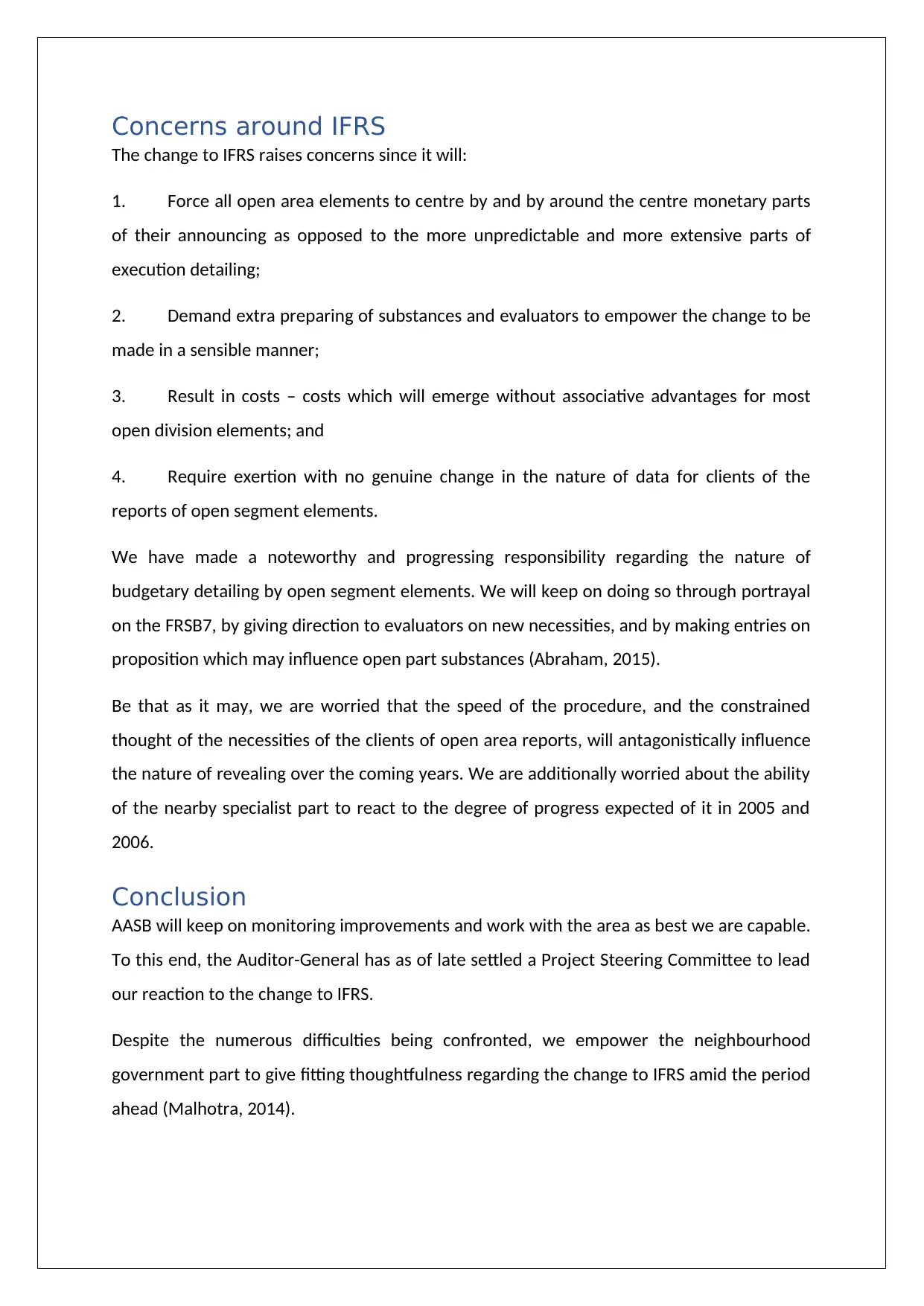
Concerns around IFRS
The change to IFRS raises concerns since it will:
1. Force all open area elements to centre by and by around the centre monetary parts
of their announcing as opposed to the more unpredictable and more extensive parts of
execution detailing;
2. Demand extra preparing of substances and evaluators to empower the change to be
made in a sensible manner;
3. Result in costs – costs which will emerge without associative advantages for most
open division elements; and
4. Require exertion with no genuine change in the nature of data for clients of the
reports of open segment elements.
We have made a noteworthy and progressing responsibility regarding the nature of
budgetary detailing by open segment elements. We will keep on doing so through portrayal
on the FRSB7, by giving direction to evaluators on new necessities, and by making entries on
proposition which may influence open part substances (Abraham, 2015).
Be that as it may, we are worried that the speed of the procedure, and the constrained
thought of the necessities of the clients of open area reports, will antagonistically influence
the nature of revealing over the coming years. We are additionally worried about the ability
of the nearby specialist part to react to the degree of progress expected of it in 2005 and
2006.
Conclusion
AASB will keep on monitoring improvements and work with the area as best we are capable.
To this end, the Auditor-General has as of late settled a Project Steering Committee to lead
our reaction to the change to IFRS.
Despite the numerous difficulties being confronted, we empower the neighbourhood
government part to give fitting thoughtfulness regarding the change to IFRS amid the period
ahead (Malhotra, 2014).
The change to IFRS raises concerns since it will:
1. Force all open area elements to centre by and by around the centre monetary parts
of their announcing as opposed to the more unpredictable and more extensive parts of
execution detailing;
2. Demand extra preparing of substances and evaluators to empower the change to be
made in a sensible manner;
3. Result in costs – costs which will emerge without associative advantages for most
open division elements; and
4. Require exertion with no genuine change in the nature of data for clients of the
reports of open segment elements.
We have made a noteworthy and progressing responsibility regarding the nature of
budgetary detailing by open segment elements. We will keep on doing so through portrayal
on the FRSB7, by giving direction to evaluators on new necessities, and by making entries on
proposition which may influence open part substances (Abraham, 2015).
Be that as it may, we are worried that the speed of the procedure, and the constrained
thought of the necessities of the clients of open area reports, will antagonistically influence
the nature of revealing over the coming years. We are additionally worried about the ability
of the nearby specialist part to react to the degree of progress expected of it in 2005 and
2006.
Conclusion
AASB will keep on monitoring improvements and work with the area as best we are capable.
To this end, the Auditor-General has as of late settled a Project Steering Committee to lead
our reaction to the change to IFRS.
Despite the numerous difficulties being confronted, we empower the neighbourhood
government part to give fitting thoughtfulness regarding the change to IFRS amid the period
ahead (Malhotra, 2014).
⊘ This is a preview!⊘
Do you want full access?
Subscribe today to unlock all pages.

Trusted by 1+ million students worldwide
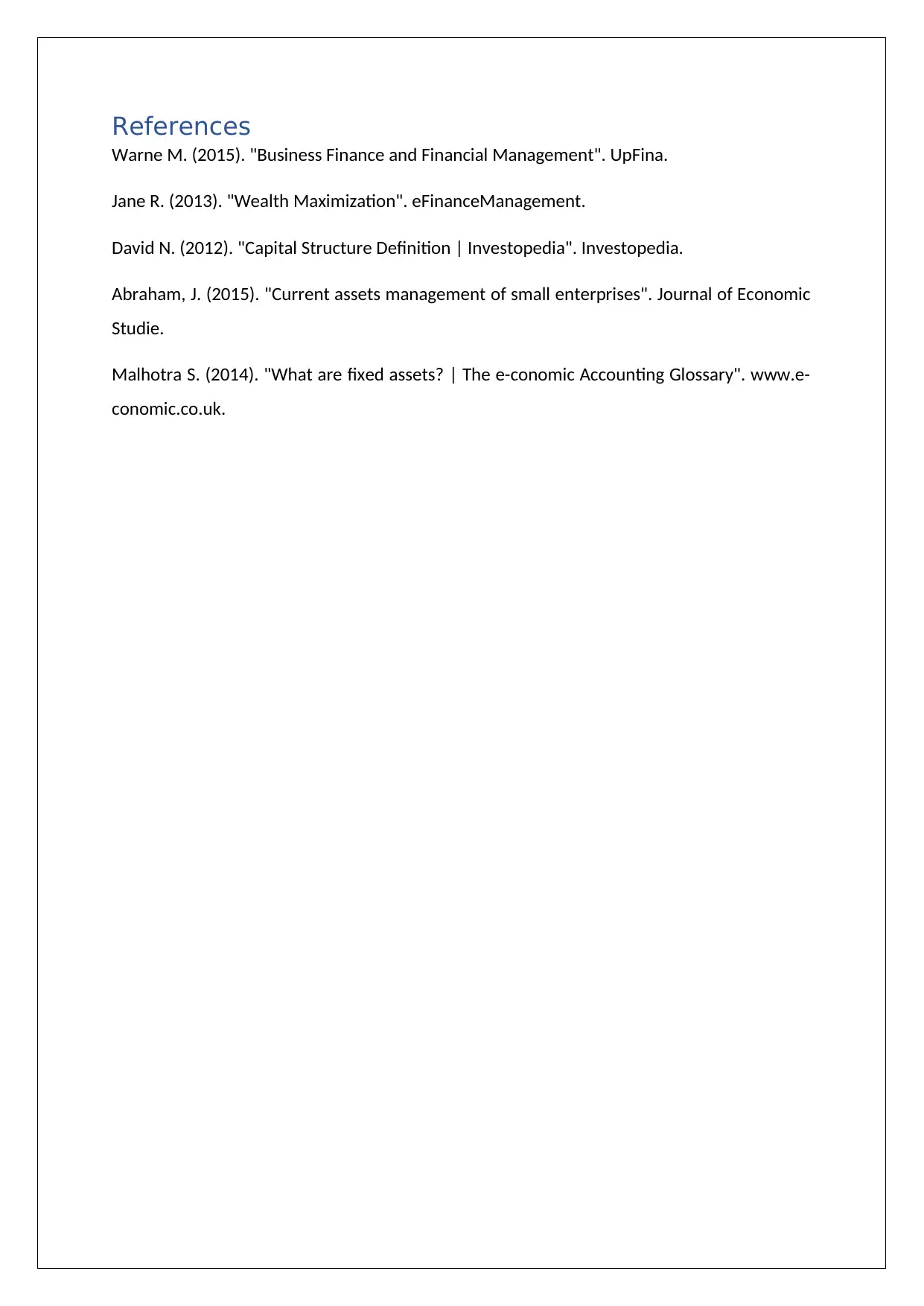
References
Warne M. (2015). "Business Finance and Financial Management". UpFina.
Jane R. (2013). "Wealth Maximization". eFinanceManagement.
David N. (2012). "Capital Structure Definition | Investopedia". Investopedia.
Abraham, J. (2015). "Current assets management of small enterprises". Journal of Economic
Studie.
Malhotra S. (2014). "What are fixed assets? | The e-conomic Accounting Glossary". www.e-
conomic.co.uk.
Warne M. (2015). "Business Finance and Financial Management". UpFina.
Jane R. (2013). "Wealth Maximization". eFinanceManagement.
David N. (2012). "Capital Structure Definition | Investopedia". Investopedia.
Abraham, J. (2015). "Current assets management of small enterprises". Journal of Economic
Studie.
Malhotra S. (2014). "What are fixed assets? | The e-conomic Accounting Glossary". www.e-
conomic.co.uk.
1 out of 7
Related Documents
Your All-in-One AI-Powered Toolkit for Academic Success.
+13062052269
info@desklib.com
Available 24*7 on WhatsApp / Email
![[object Object]](/_next/static/media/star-bottom.7253800d.svg)
Unlock your academic potential
Copyright © 2020–2026 A2Z Services. All Rights Reserved. Developed and managed by ZUCOL.




